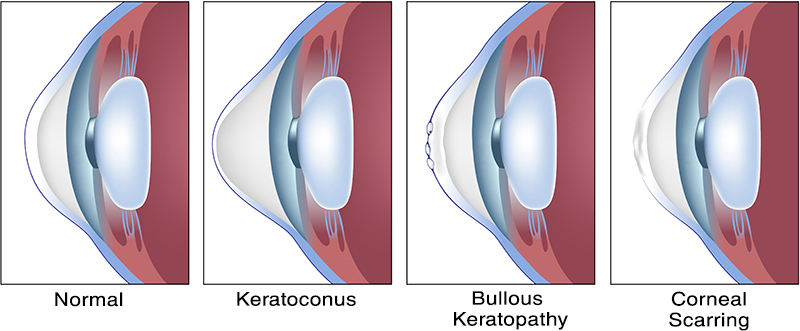
WHAT ARE THE SYMPTOMS OF CORNEAL DISEASE?
The symptoms of corneal disease can vary depending on the specific condition and its severity. However, there are some common symptoms that individuals with corneal diseases may experience. These symptoms can include:
Blurred or Distorted Vision: Blurriness or distortion in vision is a common symptom of many corneal diseases. Objects may appear fuzzy or unclear.
Eye Pain or Discomfort: Individuals with corneal diseases may experience eye pain or discomfort. which can range from mild to severe. The pain may be constant or intermittent.
Sensitivity to Light (Photophobia): Many corneal conditions can lead to increased sensitivity to light. Bright lights may cause discomfort or pain in the eyes.
Redness: The affected eye or eyes may appear red and bloodshot. once, often due to inflammation or irritation of the cornea.
Excessive Tearing: Some corneal diseases can lead to excessive tearing or watery eyes.
Foreign Body Sensation: It may feel as though there is something foreign or gritty in the eye, even when there isn’t.
Itching or Burning: Some individuals with corneal diseases may experience itching or a burning sensation in the eyes.
Decreased Night Vision: A decline in the ability to see clearly at night .once, low-light conditions is a symptom seen in some corneal conditions.
Corneal Swelling: Swelling of the cornea can cause vision problems and discomfort. It may lead to blurred vision and pain.
Eye Discharge: Infections of the cornea can produce eye discharge, which may be watery, mucous-like, or purulent (containing pus).
Halos Around Lights: Some corneal conditions, such as keratoconus, can cause halos . since, glare around lights, making night driving challenging.
Decreased Visual Acuity: A noticeable decline in visual acuity, where you may struggle to read, recognize faces, or see objects clearly.
WHAT ARE CONTRIBUTING FACTORS FOR CORNEAL DISEASE?
Genetics: Some corneal diseases, such as corneal dystrophies. thus, keratoconus has a genetic component. thus, If you have a family history of these conditions, you may be at a higher risk.
Age: The risk of developing certain corneal diseases, like Fuchs’ dystrophy, increases with age.
Eye Trauma: Injuries to the eye, including scratches, burns. thus, foreign objects entering. thus, the eye can lead to corneal damage and disease.
Infections: Bacterial, viral, or fungal eye infections can affect the cornea. Hence, if left untreated, may lead to corneal disease.
Contact Lens Wear: Improper contact lens hygiene, and extended wear of contact lenses. similarly, using contact lenses that don’t fit properly can increase .the risk of corneal infections and other complications.
Dry Eye Syndrome: Chronic dry eyes can damage the cornea’s surface over time, potentially leading to corneal disease.
Underlying Medical Conditions: Certain systemic conditions, such as diabetes and autoimmune diseases.thus, can affect the health of the cornea and increase the risk of corneal complications.
Eye Surgery: Previous eye surgeries, such as LASIK or cataract surgery.since, can sometimes lead to corneal complications or changes.
Eye Allergies: Chronic eye allergies or sensitivities can contribute to corneal irritation and inflammation.
Environmental Factors: Exposure to ultraviolet (UV) radiation from the sun without proper eye protection can contribute to corneal problems. since, Occupational hazards, such as exposure to chemicals, dust, or foreign particles, can also increase the risk of corneal injury.
Smoking: once, Smoking has been associated with an increased risk of corneal diseases and eye problems.
Contact Lens Overuse or Misuse: Not following proper contact lens hygiene, and wearing contact lenses longer than recommended.thus, not replacing them as directed can lead to corneal infections and other complications.
Why Choose Our Cornea Specialist in Chhindwara?
1. Expertise and Experience: Our Cornea Specialist has years of experience and expertise in diagnosing . thus, treating a wide range of corneal diseases and conditions. You can trust their knowledge and skill to address your specific concerns.
2. Cutting-Edge Technology: We pride ourselves on using the latest diagnostic tools and .treatment techniques to ensure the most accurate assessments and effective interventions for your corneal health.
3. Personalized Care: We understand that every patient is unique. Our Cornea Specialist takes the time to listen to your concerns, conduct thorough examinations. Since, tailor treatment plans to meet your individual needs.
Our Services:
Corneal Disease Diagnosis: Whether you’re experiencing blurred vision, eye pain, or other symptoms. our Cornea Specialist can diagnose and identify the root cause of your corneal condition.
Treatment Options: From managing corneal infections and injuries to offering advanced treatments like corneal transplantation. we provide a wide range of solutions to improve your eye health.
Corneal Transplants: Our Cornea Specialist is skilled in performing corneal transplant surgeries, including full-thickness and partial-thickness transplants, to restore vision and alleviate discomfort.
Refractive Surgery Evaluation: If you’re considering refractive surgery options like LASIK or PRK, our specialist can assess your eligibility and guide you through the process.
